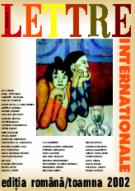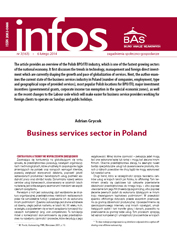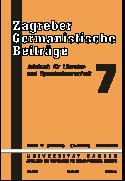



A fragment from the novel of the same name, by the American author writing in Yiddish, a Nobel Laureate
More...
An essay on insolence as reflected in literature and several reflections on the recently published book Delayed impudence by Monica Gheţ.
More...


A fragment from the novel Im Krebsgang by the German Nobel Laureate, Günter Grass.
More...
Keywords: ex Yugoslavia and the Tito dictatorship; communism in exYugoslavia;
The author draws out a comparison between Tito’s Yugoslavia seen from the perspective of the elite class oppulence and today’s decrepit realm of Tito. Paradoxically, the new generation nourishes a kind of nostalgia based on former "myths" of Tito. The author de-mythizises Tito and shows the true face of former Communism.
More...
Keywords: Chechen war; Roland Barthes and Myth; the Caucasus problem; the necessary war; violence
An essay based on Alexei Balabanov’s movie War
More...Historians from the Baltic States like to say that the Lithuanians, Poles and Byelorussians are historical brothers, since they lived in one state for many centuries, whereas the Latvians are only ethnic brothers of the Lithuanians because they lived in German-founded Livonia for some 300 years. In reality however, we lived with our Latvian brothers in one state for an equally long period of time as we did with the neighbouring Slavs, although that experience has not been actualised yet as the case with the Poles, Byelorussians or Ukrainians has. Furthermore, in Latvian
More...Russia in its policy towards the Baltic States in 1990s employed almost all available tools. It evolved from coercion (economic pressure) through attempts of “engagement and reassurance” (e.g. initiation of Russian security guarantees in 1996-97) to “differentiation” which conditioned development of economic cooperation from resolution of political problems, first of all, status of Russianspeaking minority rights in Latvia and Estonia and respect of Russian interests by Governments of the Balts. Lithuania due to objective conditions was chosen to play a role of a positive pattern of conducting relationships with Russia for other Baltic republics. Alongside with the interdependence on Kaliningrad issue, such vector of Russian Baltic policy provided for stability in bilateral relations independently from the domestic conjuncture in Russia and Lithuania.
More...The EU Energy Policy: Triumph of the Will or Reality Check?. “Gasocracy” in Russia. “Unbundling” Russia and Gas.
More...The article shows how contemporary Russia is perceived through the prism of certain antinomies and paradoxes. These concern the self-definition of Russia in the world, its civilizational-geopolitical identification, its relative weakness despite being a nuclear raw materials power, its attempts to create a new state ideology (“sovereign democracy”) colored with imperial and nationalist sentiments, and the need for Russia to give up on defining its vital interests in terms of “omnipresence” in the world as this clashes with internal imperatives, whose essence lies in economic growth and modernization. The complexity of emerging processes in Russia makes it a challenge to get to know the country better and build objective images of it.
More...The crisis in relations between Belarus and Russia that started at the end of 2006 is forcing Belarusian authorities to look for new foreign policy directions. Alexander Lukashenko has mentioned the necessity to balance Belarusian foreign policy and stop being dependant only on Russia. Such changes may encourage the EU to review its policies towards Belarus. The EU policy of isolating Belarus and applying sanctions to it is absolutely inefficient since it has not promoted either the liberalisation of the Belarusian regime or any democratisation of the society. In this article, it is argued that because of the crisis in relations between Belarus and Russia, one of two scenarios for the transformation of Belarus in the nearest future is likely to be seen: Belarus might become “a shadow of Russia” and definitively transfer its economic and political sovereignty to Moscow, or the country might become a “typical Eastern European state” trying to balance between pro-Russian and pro-European policies. The EU should strengthen selective cooperation with Belarus, first of all in the fields of economic and energy relations. Only in this way can the EU increase the opportunities for Belarus to reduce its dependency on Russia and thus maintain its political and economic independence in the future.
More...When Russia stopped oil shipments to Ventspils, Lithuania threatened in February 2007 to add its veto to Poland’s on the renegotiation of the Partnership and Cooperation Agreement. This highlights the challenges Russia-EU relations are facing. Russia’s domestic trajectory has raised alarms, yet the country remains vital to European interests. The colour revolutions of Eastern Europe put pressure on the EU to strengthen its Eastern policy. The Russia-EU legal framework is no longer adequate; a new one needs the consent of ten new members with very sceptical views of Russia, among them Estonia, Latvia and Lithuania, whose relation to Russia is unique. How different are the policies and the perception of common threats among the EU, Russia and the Baltic states?
More...The analysis, which includes non-formalised possibilities of ruling elite to exert its influence in a political system beside the formal attributes of a political regime does not allow to qualify Putin’s Russia as a democracy. Currently, the most important political decisions in Russia are being adopted by the ‘militocratic elite’ moderated by Putin. The enclave resembles a coterie that has its specific structure, performs according to its own rules of the game, and is almost unaccountable to the country’s electorate. According to some attributes, such enclave-based Russia’s political regime resembles a mixture of the “developmental”, oil exporting Asian regime and of the fascist one. However, these parallels do not imply that the future transformation of Putinite Russia will do necessarily repeat the experience of the other countries.
More...The objective of this article is the construction of an analytical model that would allow making a complex assessment of Russia’s attitude towards the EU integration model, structuring the trends of Russia’s policies towards the EU, identifying the logical links of these trends, and forecasting Russia’s further actions. In the article, it is argued that the content and form of Russia’s projections of cooperation with the EU are determined by the evolvement processes of the EU’s geopolitical subjectness. That is why the authors analyse the patterns of current EU-Russia cooperation mechanisms (for instance, the four Common Spaces initiative), model the possible scenarios of development of the EU-Russia Partnership and Cooperation Agreement (PCA), and study Russia’s attitude towards various EU integration models.
More...
Keywords: Poland; business services sector; BPO/ITO; BPO in Poland; ITO in Poland;
The article provides an overview of the Polish BPO/ITO industry, which is one of the fastest growing sectors of the national economy. It first discusses the trends in technology, management and foreign direct investment which are currently shaping the growth and pace of globalization of services. Next, the author examines the current state of the business services industry in Poland (number of companies, employment, type and geographical scope of provided services), most popular Polish locations for BPO/ITO, major investment incentives (governmental grants, corporate income tax exemption in the special economic zones), as well as the recent changes to the Labour code which will make easier for business service providers working for foreign clients to operate on Sundays and public holidays.
More...
So häufig die auffällige Traumnähe im Frühwerk Hugo von Hofmannsthals bereits zum Gegenstand von – vielfach psychoanalytisch inspirierten – Deutungen geworden ist, so selten wurde bislang untersucht, wie sich der rezeptive Eindruck des Traumhaften konkret im Text konstituiert. Ziel des Beitrages ist es demgemäß, einige der wichtigsten Merkmale traumaffiner Darstellung exemplarisch herauszuarbeiten, wobei vor allem das Märchen der 672. Nacht in den Blick gerät. Als theoretischer Rahmen dienen dazu die – nicht nur in bezug auf Hofmannsthal bedenkenswerten – Traumbeschreibungen Paul Valérys.
More...
Österreichische Literatur in Kroatien versucht in einer Reihe von Einzelstudien »das Schicksal« österreichischer Autoren bzw. ihrer Werke im kroatischen Kulturleben nachzuzeichnen. Die dritte Folge dieser Reihe bringt drei Skizzen zur Rezeptionsgeschichte von Franz Werfel, Karl Kraus und Joseph Roth, deren Werke vor ihrer Neuentdeckung für das kroatische Lesepublikum stehen.
More...